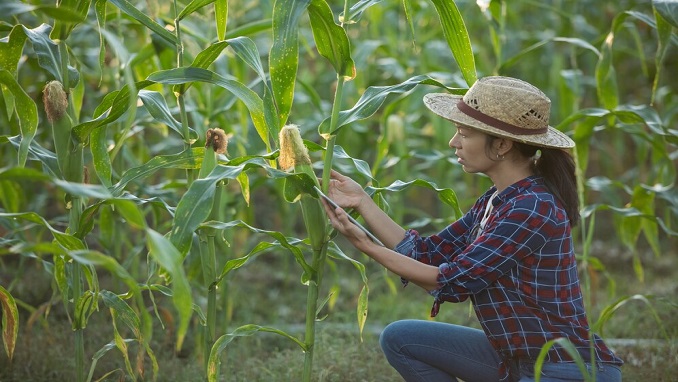“Short” is the next big thing for corn. Bayer AG’s Crop Science division is developing corn hybrids that are more efficient in several ways—and shorter.
“Short-stature corn captures sunlight, optimizes key nutrients like nitrogen, and stands up to harsh winds and challenging weather—meaning more grain can make it to harvest,” according to Bayer, a member of the Biotechnology Innovation Organization (BIO).
Bayer’s short-stature corn tops out at “around 5 feet to 7 feet” instead of the typical height of 9-12 feet, Bob Reiter, head of R&D for Bayer’s crop science division, said in a Bloomberg report last week.
The shorter stature enables the corn “to better withstand extreme winds that have been causing crop damage,” said Bloomberg, noting that a severe derecho hit the Midwest in 2020 with winds exceeding 100 mph.
The wind storm affected 37.7 million acres of farmland and caused $11 billion in damage. But the bigger concern is that we can expect more where that came from with climate change.
Why short corn is smart corn
According to Bayer, the shorter, stronger stalks produce the same yield as taller corn but are less likely to break during strong winds.
“Shorter plants also make the corn fields more accessible to standard ground equipment longer into the season, creating the opportunity for more timely, precise applications of crop protection products and other inputs,” the company noted.
Bayer scientists sorted through the corn’s genes to “identify and select existing genetic traits in corn that affect its height,” and combined “better genetic understanding and digital processes,” to harness “what previous generations of farmers and scientists could only dream about.”
Its Smart Corn System innovation, implemented to transform how corn is produced, according to Bayer, “has the potential to be a game changer and will help farmers manage risks and unlock yield potential in the face of ever-shifting challenges.”
How corn can weather climate change – sustainably
Bloomberg reported Bayer will test the crops on about 60,000 acres next year and roll out the seeds nationally in 2024, reaching 700,000 acres.
This and other crop innovations through genetics, like drought-resistant crops and crops that allow for less food loss and waste, are improving our food security.
Emphasizing the unprecedented challenges for the planet created by the global extreme weather events that have become the new normal—such as record-breaking heat waves, prolonged droughts, historic flooding, and intense windstorms—Bayer promotes its corn production system as “the next great sustainable agricultural innovation that could also tackle climate change.”
Describing the potential sustainable benefits of the system, the company explained that the short corn’s ability to withstand more volatile weather patterns “enables the planting at higher densities in the system” and the “season-long access will provide farmers new opportunities and possibilities.”
Bayer said it also offers farmers help to “develop and adopt more sustainable farming practices” which “can result in less greenhouse gas emissions and better use of inputs.”




